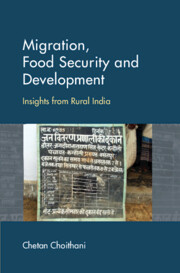Book contents
- Frontmatter
- Contents
- List of Figures, Tables and Boxes
- List of Photos
- Preface
- Acknowledgements
- List of Abbreviations
- 1 Introduction
- 2 Bridging the Disconnect between Migration and Food Security
- 3 Dynamics of Food Insecurity, Migration and Urbanisation in India
- 4 The Context of Migration
- 5 Connections between Food Safety Nets and Migration
- 6 Migration, Remittances, Land and Household Food Security
- 7 Opening the Household Box
- 8 Conclusion
- References
- Index
4 - The Context of Migration
Bihar and Siwan in Perspective
Published online by Cambridge University Press: 22 February 2023
- Frontmatter
- Contents
- List of Figures, Tables and Boxes
- List of Photos
- Preface
- Acknowledgements
- List of Abbreviations
- 1 Introduction
- 2 Bridging the Disconnect between Migration and Food Security
- 3 Dynamics of Food Insecurity, Migration and Urbanisation in India
- 4 The Context of Migration
- 5 Connections between Food Safety Nets and Migration
- 6 Migration, Remittances, Land and Household Food Security
- 7 Opening the Household Box
- 8 Conclusion
- References
- Index
Summary
INTRODUCTION
Despite the fact that migration has traditionally been an integral part of the lives and livelihoods of rural communities in much of the developing world, all too often rural populations have suffered from the image of being immobile in the academic and policy discourse around rural development. This static image of rural societies is, in part, the result of the rural-equatesagriculture paradigm of thinking which, although fading, still remains prevalent. Although livelihoods for a large majority of rural populations in many low-income countries continue to depend on local, farm-based activities, the notion of an immobile peasantry is an unwarranted assumption and, with some risk of oversimplification, a myth. The inherently cyclical nature of agricultural work means that rural populations go through cycles of peak and lean seasons. In places where rural labour markets do not provide enough opportunities for non-agricultural income diversification throughout the year – which is often the case in most, if not all, countries of Asia and Africa – many households have traditionally employed migration as one of the livelihood diversification strategies to meet their income needs outside of the busy agriculture period. As de Haan (1999, p. 7) suggests, ‘… population movement [represents] the norm rather than the exception’.
Positing the significance of migration in rural livelihoods is important for it enables viewing rural livelihood systems as dynamic, comprising of not just farm-based activities but also a wide array of local and extra-local non-farm occupations. From the perspective of food security, this implies that in addition to land-based livelihinsecurity, has always been closely connected with access to, and gains from, the non-farm, migration incomes. In fact, in many instances the extent to which land facilitates a household's food security needs is contingent upon the extent of income from non-farm sources (Pritchard, Rammohan and Vicol, 2019).
The Indian state of Bihar, the geographic focus of this study, is a case in point, where a large majority of rural households have traditionally engaged in non-farm livelihood diversification to meet their income and food needs. Located in the Indo-Gangetic plains, Bihar is endowed with highly fertile soil and abundant water sources. However, persistently high population densities have almost always counterbalanced the capacity of rural land and resources to allow the state's inhabitants to adequately meet their food security needs.
- Type
- Chapter
- Information
- Migration, Food Security and DevelopmentInsights from Rural India, pp. 98 - 131Publisher: Cambridge University PressPrint publication year: 2023



